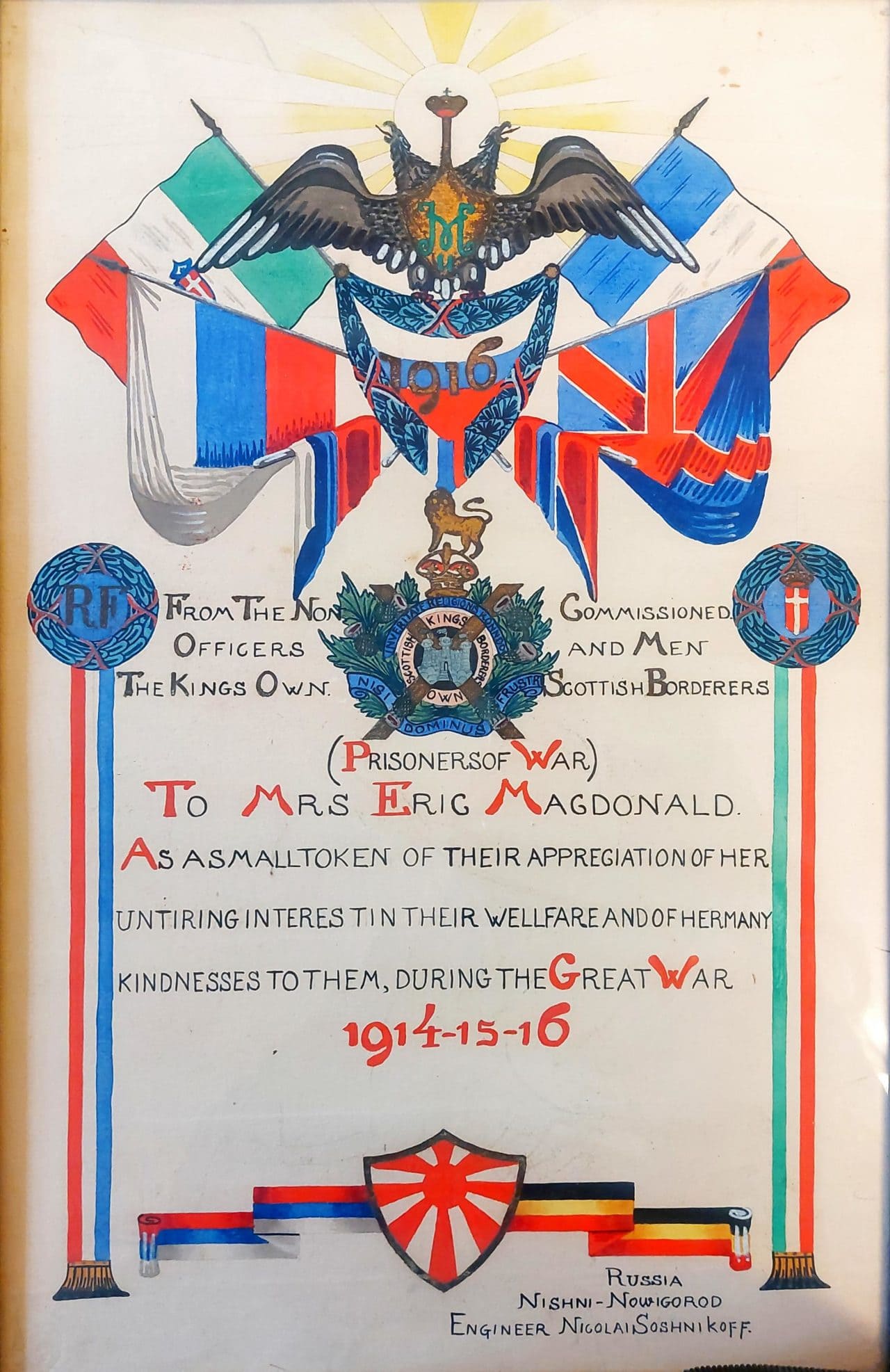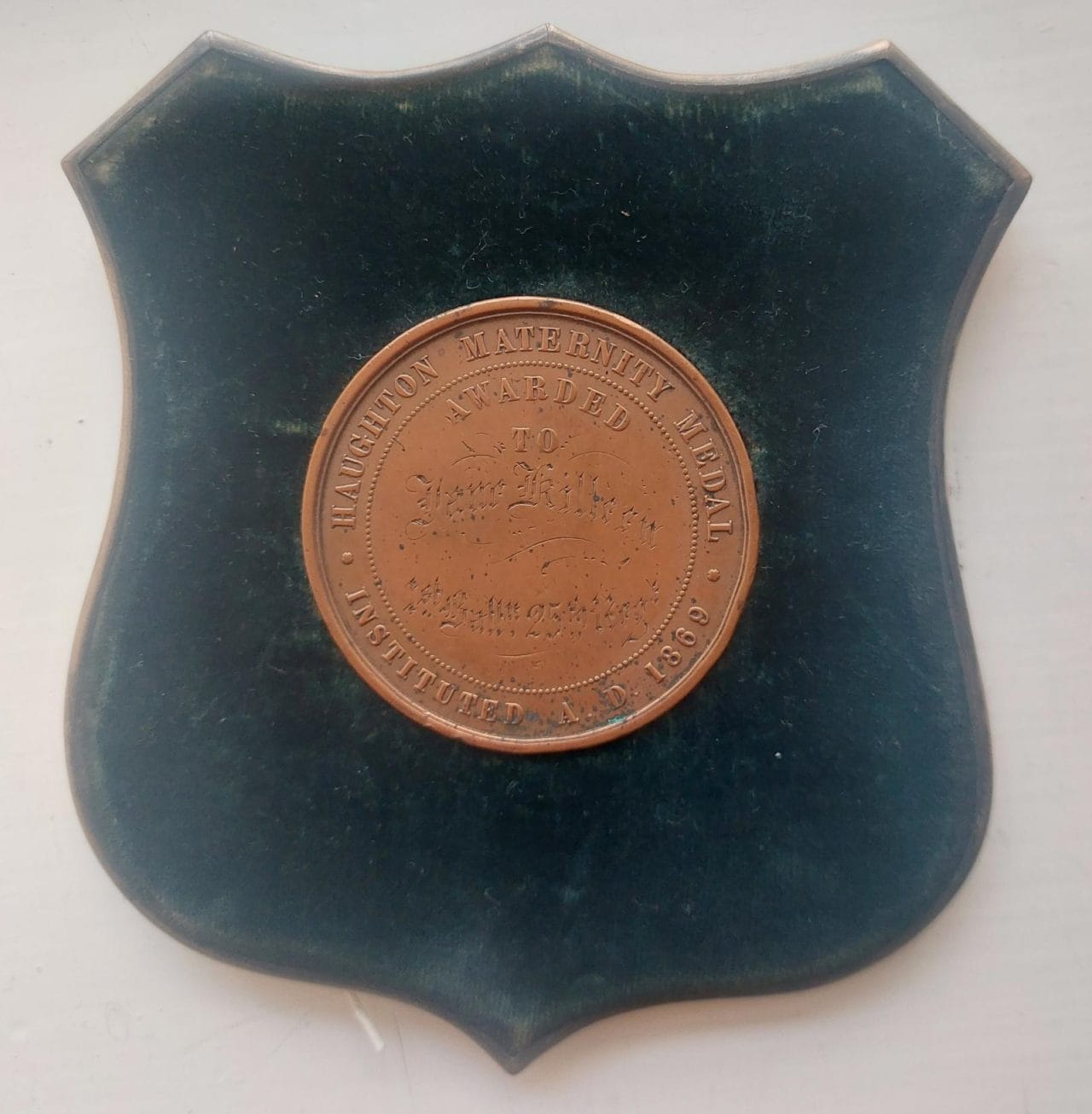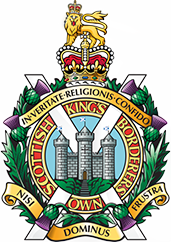Women of The King’s Own Scottish Borderers
Wandering through The King’s Own Scottish Borderers Museum, amongst its stores and archive rooms, it is understandably filled with objects usually associated with men. Photographs of men, weapons and trophies inscribed with their names, books about the regiment, all written by men. Our uniform collection, from 19th Century red tunics to desert camouflage clothing worn in Iraq, is full of items which have all belonged to the men of the regiment, although many of those early Victorian red tunics have very narrow shoulders and waists. But there are a few tales of women’s efforts to be told from the collection…
Mrs Amy MacDonald, wife of Major Eric MacDonald and mother of Major General J.F.M, both KOSB, was devoted to the welfare of KOSB prisoners of war during World War I. An elegant silver bowl with handles was given to her, engraved with the following:
‘Presented to Mrs Amy MacDonald by 300 repatriated prisoners of war of The King’s Own Scottish Borderers as a small token of their immense gratitude for the ceaseless and untiring work which she performed for their benefit from the beginning to the end of the war, 1914-1918’
The POWs also used their artistic skills to create a painted scroll, giving their “appreciation of her untiring interest in their welfare and her many kindnesses to them during the Great War”. Her actions were recognised nationally when she was awarded the MBE.

The vast casualties of World War I impacted not only the soldiers who served on the front line and POWs, but also those at home in terms of their emotional and economic welfare. Out of this struggle for soldiers and their families came the War Relief, War Memorial and Widows and Orphans funds. During the war and its aftermath, Mrs Sellar, wife of Lieutenant Colonel Sellar of The King’s Own Scottish Borderers, worked tirelessly in her efforts to find the correct support for Borderers and their families in need.
Fast forward to World War II and a notable woman connected with the regiment is Major Alison MacLaren, wife of Lieutenant Colonel Duncan MacLaren, 2nd Battalion KOSB. During the war, Alison devoted herself to the soldiers at the front line in Burma, driving around rough tracks in a battered Jeep delivering much needed meals, cakes and tea as part of the Women’s Auxiliary Service (Burma). Not only did Alison and the other WASBs provide food-based sustenance, they were also an invaluable emotional support for soldiers who were going through unimaginable experiences far from home. Major Alison MacLaren was Mentioned in Despatches three times for her exceptional work and her medals have been displayed in the museum along side those of her husband. Even after his death, she insisted on remaining in her post because of her sense of duty and devotion to those in need.
A recent find within the museum stores has been a Victorian medal awarded to a woman for her services with 1st Battalion, 25th Regiment The King’s Own Borderers. The woman’s name was Jane Killeen and the medal was given to her some time in the latter half of the 19th Century for her skills in midwifery. The medal is the Haughton Maternity Medal and was awarded only to army midwives who showed particular promise and ability. In 1869, a course had been established for the training of soldiers’ wives in midwifery, presumably to deliver the babies of women married to officers and other ranks of the regiment. Women who applied for the course needed to have a reasonably good level of education and experience to begin with, although perhaps having already birthed their own child counted as relevant experience, and they needed to be already connected to the regiment, usually through marriage. The training then took place at Sir Patrick Duns Hospital in Dublin, with Duns having served as a surgeon in The Royal Scots during the 1840s and being witness to the “grievous want of trained midwives in regiments at home and abroad”. By 1874, over 200 women had been trained as part of this initiative, with Duns being awarded a knighthood for his efforts and the best of the newly fledged midwives being awarded medals.

Around this same time period, there was a band sergeant within the 1st Battalion with the name Killeen. With such an unusual surname, it seems more than likely that this was the husband of Jane Killeen. He was awarded the Afghan medal, so perhaps Jane was with him during his service overseas, following the regiment and supporting pregnant women along the way.
Although the current museum collection does not have a great deal of material relating to women, the items we do have come with back stories that are both interesting and moving. Each of these women, in their different ways and times, have shown commitment and devotion to those in need and their actions have impacted many lives for the better.
